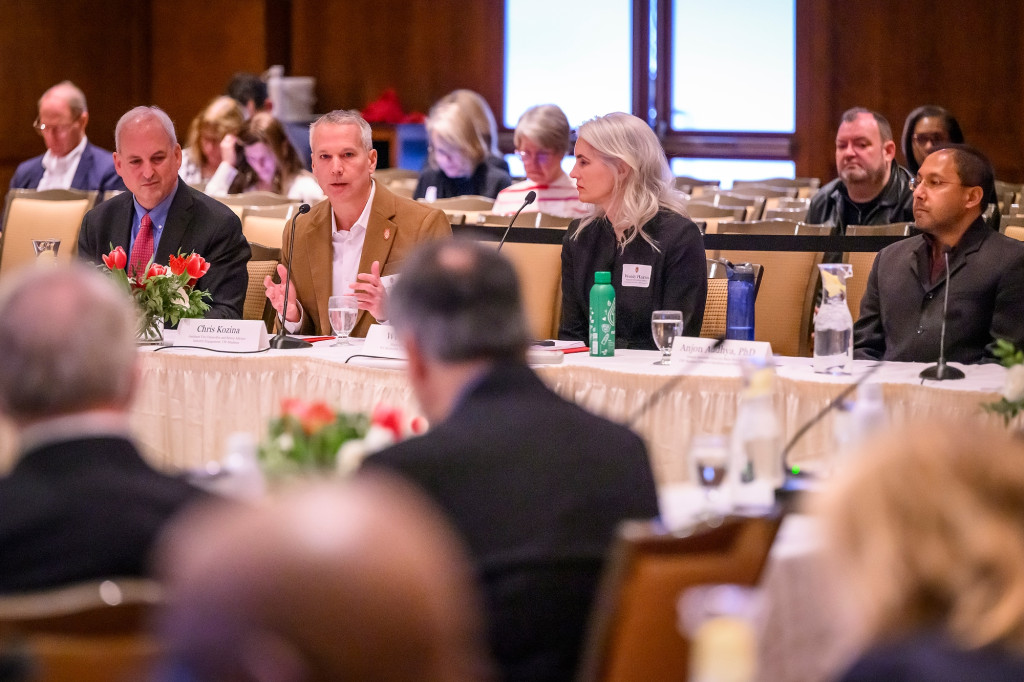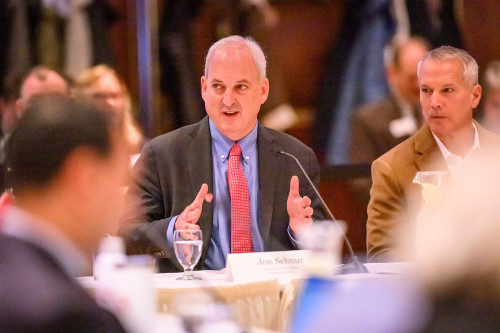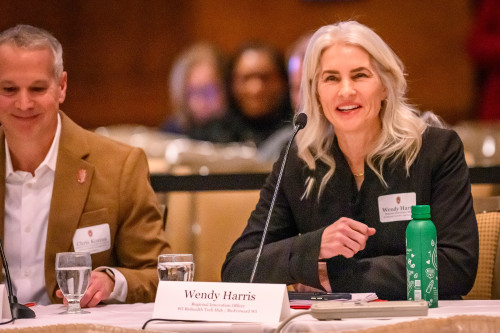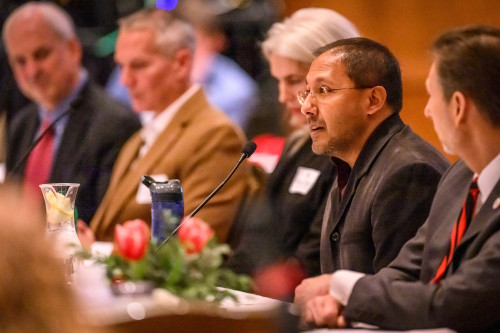Ushering in a new era of innovation and economic growth

Chris Kozina, assistant vice chancellor and senior advisor on industry engagement in University Relations, spoke about strengthening public-private partnerships during a panel discussion at the UW Board of Regents meeting on Feb. 9. Photo: Althea Dotzour
At the Universities of Wisconsin Board of Regents meeting on Friday, Feb. 9, experts gathered to discuss the university’s strategy for maximizing federal funding through burgeoning public-private partnerships, a crucial component of the national push for innovation and economic development.
The University of Wisconsin–Madison, along with the state, is poised to drive a significant increase in innovation and economic growth, bolstered by new federal funding, strengthened partnerships between academia and industry, as well as nonprofits, tribal communities, civil society and communities of practice and lessons learned from previous grant applications. This was the message from industry and campus leaders to the Board of Regents, emphasizing the critical role of UW–Madison in spearheading statewide progress.
Charles Hoslet, vice chancellor for university relations, led Friday’s panel discussion, highlighting a new wave of federal economic policy and numerous large-scale, long-term competitive challenge programs and grants that bring together networks of institutions, including research universities, around a targeted economic opportunity.
“The federal government’s goal is to invest in public-private partnerships that reach beyond simply developing new technologies or spurring innovation,” said Hoslet. “There is increased focus on promoting and stimulating economic growth and job creation across all communities.”

Jon Schnur Photo: Althea Dotzour
Panelist Jon Schnur highlighted how the landscape of private-public partnerships is changing, driven by this new wave of federal funding.
“The recipe for local economic success is different from where it was several decades ago and even several years ago,” said Schnur, who serves as chief executive officer of America Achieves, a nonprofit organization that incubates and supports large-scale initiatives to advance economic opportunity, mobility and pathways to good jobs and careers.
Several members of the panel emphasized the indispensable role universities like UW–Madison play as research engines and the strengths that comprehensive campuses in the Universities of Wisconsin can bring.
Recognizing this role and the exciting potential the federal programs present not just to the campus but to Wisconsin and the nation, UW–Madison has been expanding efforts to increase participation, including submitting applications to the Build Back Better Regional Challenge and the National Science Foundation Engines program.
Chris Kozina, UW–Madison assistant vice chancellor for industry engagement, was a leader in the development of these applications, and he offered an overview of the experience and learnings from the application process. Kozina noted that the university and its partners are growing capability and capacity to better take advantage of these federal opportunities by improving forecasting around federal priorities, advancing our understanding of where and how to win, advancing the execution of those plans and adapting our approach when needed.
More recently, the university joined a consortium of 15 public and private partners in a Phase 1 application to the Department of Commerce Economic Development Administration Regional Technology & Innovation Hub program. Wisconsin is among 31 regions selected for the highly competitive Phase 1 Tech Hub designation.

Wendy Harris Photo: Althea Dotzour

Anjon Audhya Photo: Althea Dotzour
Wendy Harris, regional innovation officer for the Wisconsin Biohealth Technology & Innovation Hub, is leading the consortium’s Phase 2 application, which could unlock access to between $50 and $75 million in federal grants. Harris noted that existing industry strengths and the ability to create a shared mission and vision for stakeholders around the biohealth sector drove Wisconsin’s success in Phase 1, as well as connections between industry and universities — a point emphasized by fellow panelist Anjon Audhya, senior associate dean for basic research, biotechnology and graduate studies at the UW School of Medicine and Public Health and who serves on the Tech Hub consortium board.
Panelists’ discussion highlighted the importance and opportunity of the moment as the university launches into several bold new initiatives designed to address global challenges. As Chancellor Jennifer L. Mnookin noted during her address to the Board of Regents, “We have a lot to be proud of. My job — our job — is to make this institution even a step stronger — by building on this excellence and also by thinking in big, bold ways about where we can take a quantum leap forward to serve this state and the world on a whole new level.”
Subscribe to Wisconsin Ideas
Want more stories of the Wisconsin Idea in action? Sign-up for our monthly e-newsletter highlighting how Badgers are taking their education and research beyond the boundaries of the classroom to improve lives.




